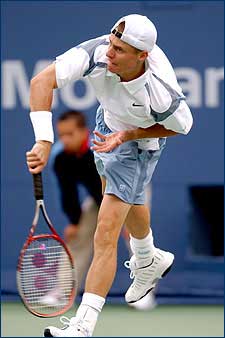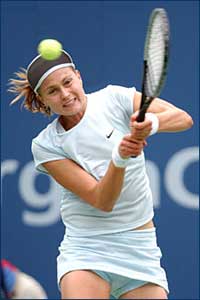<% ns_puts [mkm_getnavbar] %>
US Open Journal
Day 7
A.J. Chabria
Big rainout today, at least before my flight out. Nothing torrential,
just a patient, constant drizzle that looks like it brought along some
crosswords. The old line about actors getting paid for waiting around
rings true at any tennis tournament. They just get paid more at this one.
For much of the day, the players had lots of idle time. Rusedski showed up
bright and early at noon for his match with Pete, considering they were
the third match on the docket for Ashe stadium. Greg waited outside
awhile, talking with Joe Giuliano, a popular tour coach who I sat down
with for an interview (later). Some players crowded around the Sony
playstations installed in the player lounge. It looked like a scene from
the early eighties: the video games are hard mounted on an upright monitor
– arcade style. Others worked out or stretched. The massage therapists
said they were near capacity. The stringers were completely bored, just
waiting for some action. They were all caught up on strings jobs and
grips, which is a feat in itself.
|
|
Richard Williams arrived in a courtesy SUV without his daughters. Who
says chivalry is dead? He opened the door for his new lady who was either
making a fashion statement or was wearing a sleek, black turban to keep
the coif in check. He looked happy and confident – all smiles for the
luggage guy and onlookers in the VIP area.
Speaking of smiles, was it my imagination or was Lleyton Hewitt on his
best behavior yesterday against Blake? Nary a “Come onnN!” or a chest
thump. Even fist pumps were somewhat discreet. I spoke with an Australian
journalist on the ride to the hotel last night. And yes, he speaks
Australian. I thought this was interesting,
“Hewitt’s reputation is so poor (even back home) and he’s such a contrary
little bugger that even when he behaves or does something nice, it’s
viewed as contrived.”
That’s already the case among the tennis cognoscenti. Except Kim Clijsters
of course, who continues to defend him, “He’s a really nice guy.” That’s
it, Kimmy, stand by your man.
It made me think of men and women on the circuit. The two tours
intermingle more often now, which should lend itself to more player
dating, and it has to a point. What about coaches dating players? Rafael
Font de Mora has coached Meghann Shaughnessy since she was 13. They’re
engaged now, and she’s enjoying her best year yet.
What about coaches dating coaches? Unfortunately, there are hardly any
female coaches out here. The exceptions are few and most of them are also
known as “Mom”.
What about coaches in general (seriously coaching)? Coaches like Brad
Gilbert, Larri Passos, Paul Annacone, Darren Cahill, Peter Ludgren and
Jason Stoltenberg get a lot of ink and it’s all well-deserved. They’re
brilliant, they’re celebrities, and they coach the most talented guys in
the world.
The fellas who are out there coaching women, though, those guys have a
tough assignment. This past week, I’ve observed several women practice
with male hitters and male coaches. Everyone seems to be working hard and
treating each other with respect, but you’ve got to wonder how men and
women get along in this non-traditional workplace. Often it’s an intense
relationship that needs to be carefully managed and as with any other
relationship, communication is key.
Sure, there are a few dads who didn’t make it as soccer players or boxers
and are genuinely living vicariously through their little girls. But for
the most part, at least at the top level, the successful coaches are
admirable, intelligent, sensitive guys.
|
|
Some were great players in their own right. Some wouldn’t survive a
weekend in the A flight of a Club singles championship. Many grew up with
a concept of the way tennis should be played that is worlds apart from the
baseline bashing that’s de rigueur in today’s women’s game.
A few days ago, I observed the unseeded giant-killer Elena Bovina work out
with her coach, Joe Giuliano. The 6’3” Russian is definitely the
Cinderella story here at the Ball as she took out the 5th seed Jelena
Dokic in straight sets.
As they drilled, Joe mentioned something good she’d improved since the
great run she’d had in Warsaw earlier this year. He began to follow up
with some constructive criticism on her volleys. She quickly took offense
then took a cleansing breath. She walked halfway to the net and told him,
“In future, don’t bring up the net stuff. It’s negative.” Joe tried to
spin the positive, but Elena maintained, “Yes, but no, just for future,
that’s all, okay?”
A coach has to walk a fine line, reading his student every step of the
way. Nobody wants a ‘yes man’, but timing is everything and guys like Joe
are faced with a tall order: communicate clearly and know when to weave
between giving confidence and giving advice. I sought Joe out for an
interview and sat down with him this morning.
Joe’s a passionate and talented man whose physique and playing style could
not be more different that Bovina’s. He has been working with her for
about five months and had some candid thoughts on their time together and
on being a tour coach in general.
ajc: What advice would you give to a
male coaching a female tennis player at this level?
Joe: Have patience. Know the player’s
game. Ask questions. Find out how much the parents are involved. How
hungry is the player? How hard does the girl want to work?
ajc: Does she ever resist your advice?
Do you two ever argue?
Joe: Yeah, but you have to accept it
as a coach, as a player. At first, she was all ears, man. ALL EARS. She
didn’t know nothin’ about closing. She didn’t even know how to volley. The
girl had hands like a…bricklayer. When she learned a little more and
thought she was on her way, she got more confident and spoke up more. Part
of the deal, man. It’s good.
ajc: What have you worked on with
Elena, technically?
Joe: Forehands. She needed to hit the
ball with more spin, so we worked on that, like getting under the ball and
controlling it better. She used to slap the ball all the time…completely
flat. We work on volleys. Definitely the serve, too. No reason for her not
to have a big serve. She’s worked hard on it. She’s coming around.
ajc: Did she always have that backhand
down the line?
Joe: Her technique’s always been good.
I tried to get her staying turned a little better for the down the lines,
mostly her confidence in it has picked up.
ajc: What about strategically?
Joe: Finshing points off. Closing,
cutting balls off, getting in there and instead of trying to hit winners
from the midcourt, to follow it in and close points out with an angle or a
drop volley.
ajc: She looked good doing it in the
Dokic match, huh?
Joe: Yeah, that’s the key for her,
‘cause she sets up points really great with the returns and the
groundstrokes. A lot of girls can get themselves into a winning position,
but it’s that ability to close that makes the difference.
ajc: She’s tall and strong. Does she
move well enough to close aggressively?
Joe: That’s one of the other things
we’re working on, her quickness and her ability to read a situation.
ajc: Can you teach reading?
Joe: Yes and no. She has the
potential, and she knows she’s gonna have to if she’s gonna compete with
the better players.
ajc: Can you teach touch?
Joe: No. Yeah, well, to a point. Like
I said, she used to have no touch. She’s gotten a lot better, especially
when she can set a point up and close.
ajc: Who coached her before you?
Joe: Some Russian guy, I don’t know.
ajc: Who else?
Joe: Her mom for about four months.
Elena won one match in those four months.
ajc: Parents are sometimes a sore spot
with coaches…
Joe: Yeah, well they have NO spot with
me.
ajc: She’s playing Francesca Schiavone
of Italy next in the round of sixteen. How’s she feeling?
Joe: Good. Schiavone was her first
hardcourt win this summer in Manhattan Beach. She really started it well,
she’s had good results in New Haven, too. Had set points against Mauresmo,
who got the semis there and won Montreal.
ajc: Great, good luck to her. But, a
couple questions about you now. Where do you live?
Joe: Moscow (laughing). Naw, man…I
have no address, I’m from here, but I’m all over the place with Elena and
her mother.
ajc: You’ve coached some guys in the
past -- some big names…
Joe: Oh yeah, Yevgeny for a while,
Mirjana Lucic when she got to the semis at Wimbledon, Pierce for a while,
Sarge Sargsian, Vince Spadea, but then his parents started getting’
involved.
ajc: I know you’re great buds with
Brad Gilbert and Johnny Mac.
Joe: Brad’s my best friend, John is
too. I’ve learned so much from them. I owe them both a lot. I took Elena
to Brad’s this summer.
ajc: So, in addition to Brad, who
would you consider your biggest influences as a coach?
Joe: Definitely John, Andre Agassi and
Patrick McEnroe. Nicest guys.
ajc: What was your toughest moment as
a coach?
Joe: Coaching Spadea in ’99 when he
played Andre at the Australian Open.
ajc: Spadea got him, right?
Joe: Yeah, it got ugly, man. It wasn’t
easy for me. I mean, I knew Andre’s game and Vince had the plan, and Andre
was not having a good day out there. Man, it got ugly.
ajc: Between you and Andre, you and
Brad?
Joe: No, just ugly. The whole thing,
you know?
ajc: Any desire to get back to
coaching on the men’s tour?
Joe: Nope. Not at this point. I really
want to see this through. I’m interested in seeing how far this girl can
get.
ajc: We are too, Joe. Thanks…All the
best.
Joe: Have a good flight home, buddy.
Take care.
Your comments are welcome. Let us know what you think about AJ Chabria's article by emailing us here at TennisONE.
To contact us, please email to: webmaster@tennisone.com
TennisONE is a registered trademark of TennisONE and SportsWeb ONE; Copyright 1995. All rights reserved.



